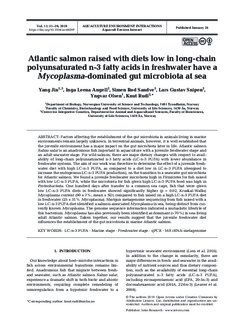| dc.contributor.author | Jin, Yang | |
| dc.contributor.author | Angell, Inga Leena | |
| dc.contributor.author | Sandve, Simen Rød | |
| dc.contributor.author | Snipen, Lars-Gustav | |
| dc.contributor.author | Olsen, Yngvar | |
| dc.contributor.author | Rudi, Knut | |
| dc.date.accessioned | 2019-04-02T06:33:23Z | |
| dc.date.available | 2019-04-02T06:33:23Z | |
| dc.date.created | 2019-04-01T13:25:06Z | |
| dc.date.issued | 2019 | |
| dc.identifier.citation | Aquaculture Environment Interactions. 2019, 11 31-39. | nb_NO |
| dc.identifier.issn | 1869-215X | |
| dc.identifier.uri | http://hdl.handle.net/11250/2592795 | |
| dc.description.abstract | Factors affecting the establishment of the gut microbiota in animals living in marine environments remain largely unknown. In terrestrial animals, however, it is well established that the juvenile environment has a major impact on the gut microbiota later in life. Atlantic salmon Salmo salar is an anadromous fish important in aquaculture with a juvenile freshwater stage and an adult seawater stage. For wild salmon, there are major dietary changes with respect to availability of long-chain polyunsaturated n-3 fatty acids (LC-n-3 PUFA) with lower abundance in freshwater systems. The aim of our work was therefore to determine the effect of a juvenile freshwater diet with high LC-n-3 PUFA, as compared to a diet low in LC-n-3 PUFA (designed to increase the endogenous LC-n-3 PUFA production), on the transition to a seawater gut microbiota for Atlantic salmon. We found a juvenile freshwater microbiota high in Firmicutes for fish raised with low LC-n-3 PUFA, while the microbiota for fish given high LC-n-3 PUFA feed was high in Proteobacteria. One hundred days after transfer to a common sea cage, fish that were given low LC-n-3 PUFA diets in freshwater showed significantly higher (p = 0.02, Kruskal-Wallis) Mycoplasma content (90 ± 7%; mean ± SD) compared to fish raised on a high LC-n-3 PUFA diet in freshwater (25 ± 31% Mycoplasma). Shotgun metagenome sequencing from fish raised with a low LC-n-3 PUFA diet identified a salmon-associated Mycoplasma in sea, being distinct from currently known Mycoplasma. The genome sequence information indicated a mutualistic lifestyle of this bacterium. Mycoplasma has also previously been identified as dominant (>70%) in sea-living adult Atlantic salmon. Taken together, our results suggest that the juvenile freshwater diet influences the establishment of the gut microbiota in marine Atlantic salmon. | nb_NO |
| dc.language.iso | eng | nb_NO |
| dc.publisher | Inter Research | nb_NO |
| dc.rights | Navngivelse 4.0 Internasjonal | * |
| dc.rights.uri | http://creativecommons.org/licenses/by/4.0/deed.no | * |
| dc.title | Atlantic salmon raised with diets low in long-chain polyunsaturated n-3 fatty acids in freshwater have a Mycoplasma-dominated gut microbiota at sea | nb_NO |
| dc.type | Journal article | nb_NO |
| dc.type | Peer reviewed | nb_NO |
| dc.description.version | publishedVersion | nb_NO |
| dc.source.pagenumber | 31-39 | nb_NO |
| dc.source.volume | 11 | nb_NO |
| dc.source.journal | Aquaculture Environment Interactions | nb_NO |
| dc.identifier.doi | https://doi.org/10.3354/aei00297 | |
| dc.identifier.cristin | 1689452 | |
| dc.description.localcode | 2019 Open Access. CC-BY 4.0 | nb_NO |
| cristin.unitcode | 194,66,10,0 | |
| cristin.unitname | Institutt for biologi | |
| cristin.ispublished | true | |
| cristin.fulltext | original | |
| cristin.qualitycode | 1 | |

